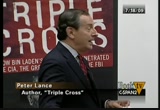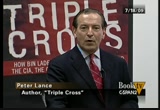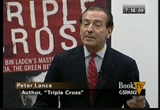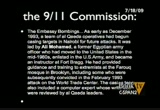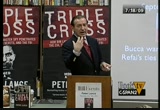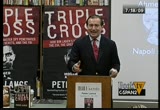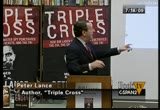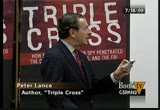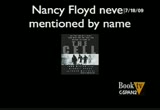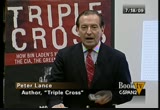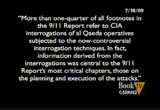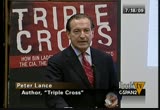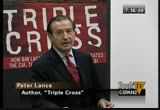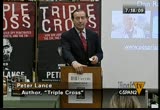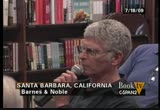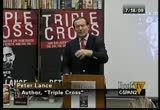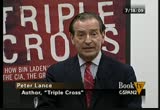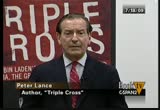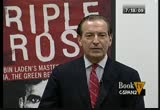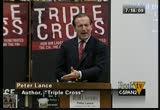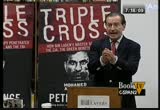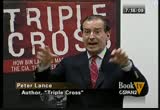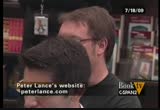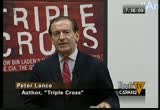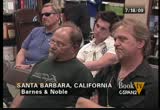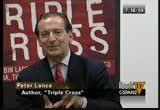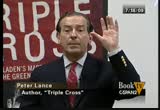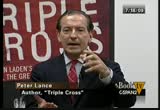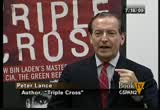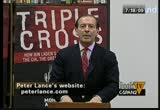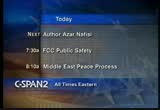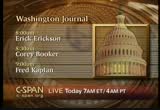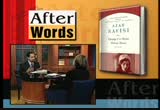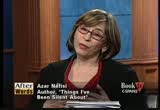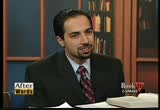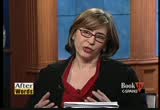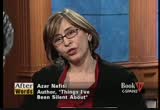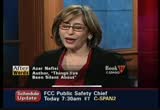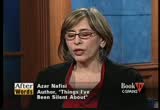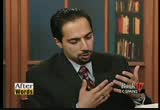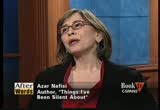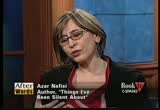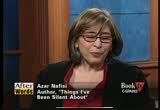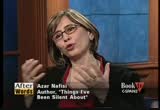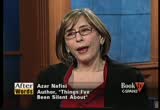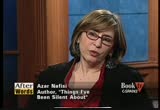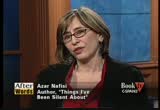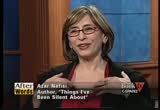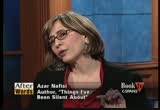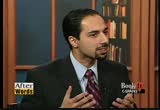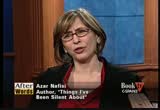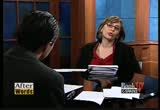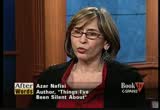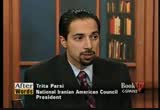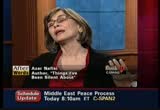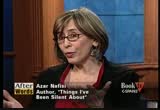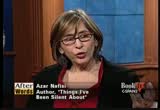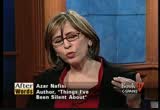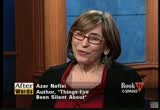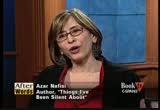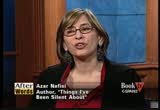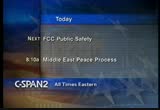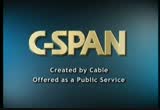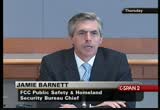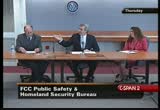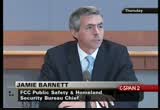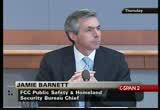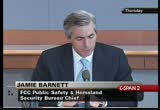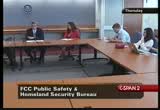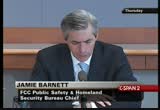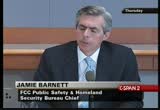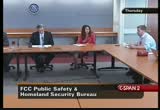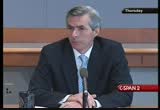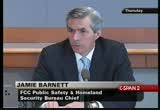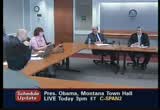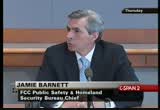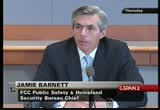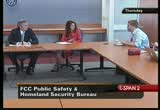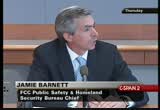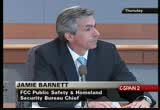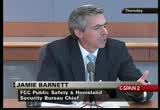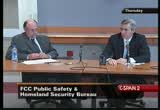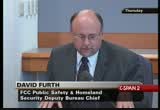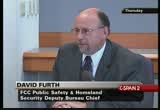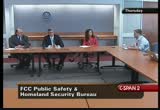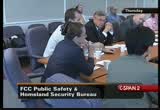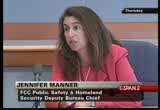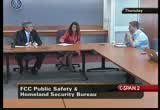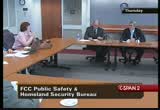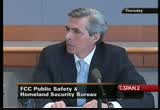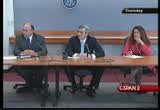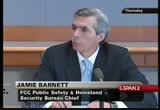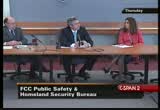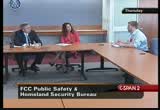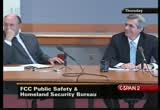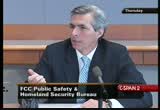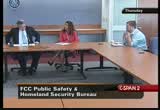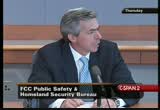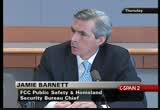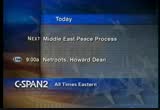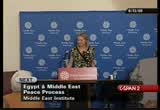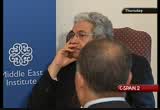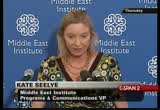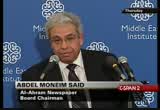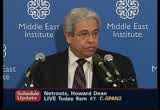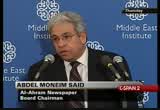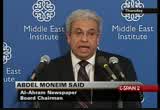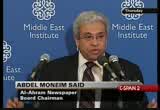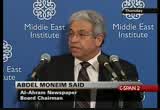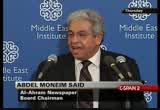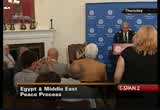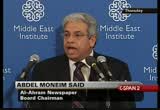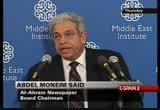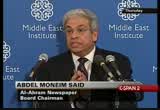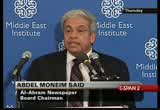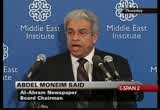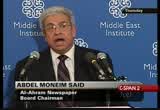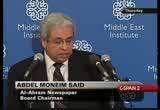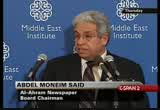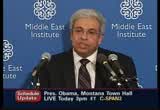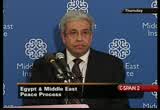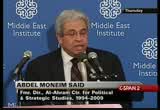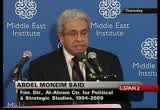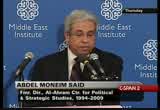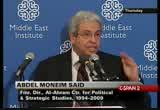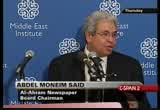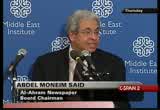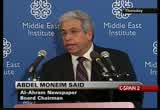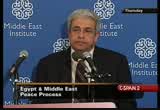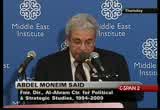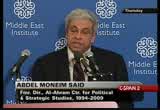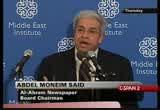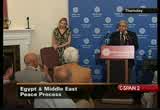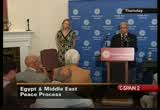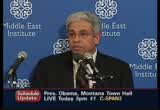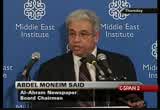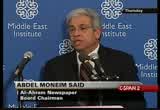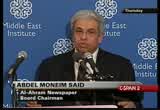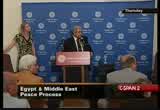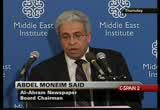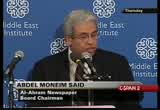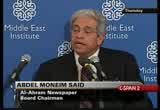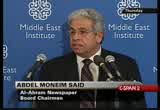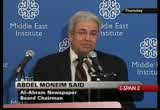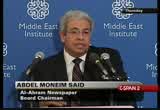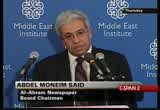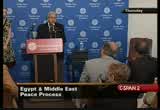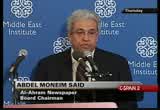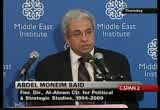tv Today in Washington CSPAN August 14, 2009 6:00am-9:00am EDT
6:00 am
6:01 am
fitzgerald who is the general in the war on terror metaphorically speaking, climbs in meet ali mohammed in a restaurant across from the state house and ali says i love bin laden. i don't need a fought what to attack in america. and he does, like this in the walks out and patrick fitzgerald. the audacity of this guy. guess what? fitzgerald turns to clinton and said he is the most dangerous man i've ever met. we cannot let this man on the street. left him on the street for ten months only to have the bombs go off in kenya and tanzania, a plot that ali not only began in 93 but literally was one of the principal practitioners of. it took him months ali mohammed on september 10 of 98. he is held under a john doe warned. they didn't want the media to know who this guy was. they finally cut a deal with patrick fitzgerald to avoid the death penalty. he is known custodial witness protection somewhere.
6:02 am
nobody outside of the government knows where this guy is. he is the one man living 9/11 commission. when you cut a deal with a witness to get something in return. sammy-- it's five years. he is the star witness in all of the mob cases. ali mohammed is never called by patrick fitzgerald in the most important case of his career, u.s. versus bin laden in february of 01. imagine that they called ali and defense attorneys peel back the layers the way i had done in this book three, for how many months before 9/11? maybe someone with that connect the dots. one week after 9/11, he writes out, jacqueline flies to new york and the brink aaliyah from florida where he is thing and he writes, he writes of the whole plot. he had to know. he was in bin laden house training his bodyguards. the principles by about qaeda. get to know the plot because how could he not?
6:03 am
the platts began in 94. eve nicki take the 9/11 commission, he had to know. so, how was it that patrick fitzgerald cut a deal with him arrested him in 92 years before 9/11 and never got the plot out of him. that is a question i would like to ask if patrick would show up at a forum on booktv or me me anywhere. 9/11 report, they have a very, here is what they say. the embassy bombings as early as december 93 operatives began casing targets and nairobi. he provided guidance and training to extremeness at the fruit muskin bergland including some convicted in the 93 attack. the easy team included a computer expert hugh ronnettes were reviewed by al qaeda leaders. there is not much more about ali mohammed in the 9/11 report. none of his meetings with
6:04 am
fitzgerald, snook green offence all of those years, none of that is in the 9/11 report. why should we care? here is the point. remembers things trading? remember the story i told you. napoli knew that nosair was in the blind shakes terror group. september of 1999 fire marshal ronnie book of who was not only a hero at the fire department who literally had his back broken in a rescue and could never tired and a three quarter pension but went back to rescue one and then became a fire marshal. he was in a military intelligence unit in the reserve and stationed at the defense intelligence analysis center in washington where he had a top-secret clearance. he was stunned watching the fbi negligence. he can't believe it so he is in the fire department working terrorism and 99, when he finds out that there is a guy named
6:05 am
akhmed luff by u.s. ties to the blind sheikh. he is ben fd nya accountant. he is literally, this is him. use on the arm of the blind sheikh. he is acting as translator. he is absolutely al qaeda and a high level and working as an accountant. book of finds out in 1999 that he gets the plans of the world trade center prior to the first bombing. he didn't show up that day. he tells them, 1999. what the link had been pursued? remember i told you that sphinx trading was located right below? this is the sheikh's moss. this is the mosque and this is sphinx trading right below, the same building. check cashing mailbox store.
6:06 am
that is where they had a box for good they did money transfers to the middle east. nosair has a box there. this is the sir of incorporation that lead paint december 1587 that shows wally-- you see the close-up, vitco incorporators of these things. andy mccarthy and patrick fitzgerald in their day of tiered case, told a the lists of 172 coconspirators, while lead al norris on the list. they consider him import enough to put on a list with ali mohammed and osama bin laden. that is the second got on the chart. where dew thing two of the 9/11 hijackers, got their fake ideas in july 2001, 2 months before 9/11? these two guys flu naa 77 into the pentagon.
6:07 am
this is him being arrested. john gotti social club in little italy. the fbi monitors it for seven years. they photographed every living sicilian american they came in and went out of that place. it took three times, remember that teflon don beith the fed three times? finally they put a mic in the apartment that they would go upstairs and they got got a. could for the feds on that one. but, if they had pushed him% of the energy into busting the al qaeda and focus sing and surveillance sphinx trading that they put on john gotti's social club that towers would be standing in lower manhattan. that is my opinion. he read my book and see what he may think. just put a portion of the energy you put in going after the mafia into this al qaeda conspiracy and they would have been right in the middle of this plot to
6:08 am
months before 9/11. a distortion of history. do you know what happened to nancy floyd? arguably the most important asset at the time. did she get a corner office in the hoover building? no, they opened an internal investigation on her and she was suspended for two weeks and put on the street insubordination. when john miller but his famous book that abc used in part for the 9/11 miniseries, former abc correspondent who interviewed bin laden, has a stellar reputation. never minces nancy floyd by name. that is like telling the story of paul richter without mentioning the horse. the path to 9/11 was done napoli is not one of the heroes in nancy's reduced the role of an assistant. john miller is the lead character and where is john today? he is the chief flak for the fbi, the chief the archive for
6:09 am
the bureau of federal investigations. this memo, remember i told the deitrichs now, patrick fitzgerald and valerie petrone. she is the general counsel for the fbi. she is the head lawyer for the fbi. dietrick snow went on to represent elliott spitzer and even defendants that thereafter the whole fallout over the. patrick fitzgerald this in the u.s. attorney's office in chicago, sending letters to kill peter lance's book. chapter 5 of the evidence brought to the 9/11 commission when i testified was reduced to this footnote. who is the man i testified before? ayman you should have been a witness in front of the commission and he has me in a windowless conference room, the recording equipment and die so mistrusted him that i sent all of the others and it ended up in the national archives but they reduced everything i said about the plot starting in the middle
6:10 am
of 94 to this footnote and do you know who they cited as the authority for when the plot started two years later? khalid sheikh mohammed. that is like acting-- asking david berkowitz when he did the first son of sam murder. robert wyndham of nbc news just recently did a study. more than one-quarter of all footnotes in the 9/11 report workforce dia interrogations of al qaeda operatives injected to know controversial interrogation techniques. one out of every four footnotes in the report, that is who they are siding is authorities. this is the piece that broke the story on the. >> .com. this is my peas for playboy that you can get on line or go on my web site and download it if you don't want to look at the pictures. the chilling effect. that is what patrick fitzgerald attempted to do and try to shut this book down.
6:11 am
why should we care? ramzi yousef is the reason for 1996, 1994. he had the, the reason u.s. to take your shoes off is the kid the batteries for the bomb on the plane in the heels of his shoes. i filed a complaint against patrick fitzgerald on the 15th of june with the justice department asking for the same internal affairs investigation nancy floyd was of subjected to. we will see the department takes it seriously. sense r. from griswold in the "new york times," books once the bin, they won't burn. ideals won't go to jail. the only weapon against that ideas is better ideas. justice louis brandeis said sunlight is the best disinfectant. what we need in this country is a truth commission. we need to bring all the
6:12 am
mohammed out of hiding and put them in front of a joint senate house intelligence committee where he can peel back the layers on the decades of mythology that existed in the southern district. patrick fitzgerald needs to have the guts to face me in an open forum. not try to sue me for libel in keep my book from the light of day but to debate me. let's dancers some of these questions. you are a great man and a great public official but you need to be held accountable for your gears in the southern district. that is basically my presentation but before you clap i want to say two quick things. ronnie bucca, heroically when they found his remains he had taken off his coat and put it over people to keep them from the flames. he once said, years before when he was desperately trying to get people to listen, it is about the crusades. we took their councils and they are going to come back to take hours.
6:13 am
i want to do this last tribute to walter cronkite. when i was in college i had the luck to go one day and spend the day at the cronkite news. i wrote this piece for my literary magazine for the college in boston northeast and that i went to. it was one of the most important events of my life as a reporter to watch walter cronkite close at hand. tin rather many years later on "the cbs evening news" in the bully pulpit that walters said in did to pieces on two consecutive nights reporting from iraq and in my first book. god bless walter cronkite. thank you. [applause] so, what is our overall time at this point? we are almost up to hours? are we okay? can we have some questions from the audience, please?
6:14 am
i don't think it is on. do you want to switch it on? take a minute. talk loud and i will hear. [inaudible] >> i go with that. it sounds very credible. but, what about the fact that according to richard clarke, condoleezza rice was repeatedly warned immediately preceding the attack that this was going to happen. she gave them the run around. >> absolutely in my book brother. i have that in my second book which covers the 9/11 commission in detail. i have been critical of the eighth to bush bookends in particular but also the clinton years because they happen defaults most of this period
6:15 am
during the clinton administration. that is why people on the left and right have embraced my work. you are totally by about condi rice and also condi rice remember they thought the white house under bush getting the presidential daily breathing, reveal to the public? they repeatedly fought the 9/11 commission even been conceived. they tried to underfund the commission, and philip zoelleck of the director was one of the people cherry-picking the evidence was a cronie of condi rice who ended up working for condi rice after birds. you make a valid point. >> it is hard for me to believe that it doesn't go deeper, that there wasn't the leppert involvement on the part of the administration, and as evidence for that, what about the fact that we had just coincidently war games going on that involved u.s. jets, the jets that would that then scrambled, that should've been scrambled.
6:16 am
that is quite a coincidence. all days for that to be happening, that was happening on the morning of 9/11. >> i actually went one step further in my book cover up for i found out the 77 air wing of the new jersey national guard which was a comparable wing to the otis air national guard base that was 130 some miles a way that showed up late that was summoned, this fareway had to fighter jets in the air doing maneuvers over the pinelands of seven new jersey, could have easily gone to new york to interdict the second flight. if anybody in the wide tested given issue down order. but, when it comes to the inside job theory, i am not saying, i don't subscribe to it but i am open to the truth than the point of what you are saying, why did tower seventh clearly was imploded later in the day. i don't believe the two principal powers were but these are all important questions.
6:17 am
governor kaine nyquil mackey my book found that about 177th air wing and said we are going to find out, this is outrageous. not a word to the 9/11 commission. there's a brief reference to a deactivated marad base as it because it was deactivated it didn't have planes in the sky. every single one of these questions need to be rancic. the 9/11 commission was an absolute whitewash and patrick fitzgerald testified before the commission, one of the last officials in june of 04. he devoted to lundrigan 80 words, 10% to ali mohammed. not a word. i told the tonight about negligence, just about how ali was and what a propelling spy he was so i totally agree with this man. we need that information to come out. we need the truth truth commission. we need a commission populated
6:18 am
by scholars, by journalists, by the 9/11 victims families, by guys like you, people that read and are concerned and have subpoena power and not that anybody be on the commission that had anything to do with the intelligence community in the years leading up to 9/11. next question please. i hope we can get them mike working. >> if mr. fitzgerald were to agree to meet you at subway in manhattan what would be the top two or three questions to ask him? the question number one white-- after he said he is the most dangerous man i've ever met mek alitha ma on the street. why did two go to deal to avoid the death penalty and not have ali mohammed testify as the star witness? why did the southern district-- remember i showed how yousef had the wanted posters and there was a 2 million-dollar reward? the old-fashioned wild west, wanted posters, a reward.
6:19 am
guys sees it and dropped a dime and that is how they get yousef. they kept secret the indictment of khalid sheikh muhammad four years. the day ramzi was sentenced in january of 2008, there was a famous front-page story. i am a terrorist and i am proud of that. on the inside of the "new york times," today the southern district happen to unsealed warned against sheikh mohammed believe to be a relative of yousaf. deberry this thing at the bottom of the story. why did they keep the hunt for khaleej sheikh secret? that is an important question i would like to ask patrick fitzgerald. if you go to peter lance.com and demo the time when our get the book you will see and understand why i feel that way. next question please.
6:20 am
>> have you read the new pearl harbor by dr. david ray griffin? >> i've not only read it but he has my permission to excerpt significant parts of my work coming in either the book for the next one so i am aware of his work. as i said i am not a subscriber of the inside job theory because part of the problem with the inside job theory is that it tends to invalidate the validity of al qaeda and the threat that it poses in this country. that is not to say that elements in this government, the cia, the fbi having helped the mujahedeen, having helped create the bin laden. >> that exist today didn't do things to protect guys like ali mohammed over the years and aid and abet and that is not to say they didn't do multiple acts of cover-up in order to protect themselves from embarrassment and all of the things that document in my book are jot xiaoping enough. they are enough to be terrified about when it comes to the risk
6:21 am
that we remain at in one of the most important things and the reason i keep doing these books, the fbi is still to reform. there are 30 arab speaking agents at this point. how many years after 9/11? 30 speak arabic. none in senior management to my knowledge. the virtual case file system. they had a paper driven culture. one of the reasons they gave, we have all this on paper said they spent hundreds of millions on a trilogy project to do what i did, datamining. they spent, and a scrap the program several years sector 9/11 and hired martin to do a thing called sentinel. so how is it that an fbi agent now in the field with a blackberry can't-- in the name of a suspect and have it instantly go to the fbi files and cross-check? i suspect one of the reasons they have been so reluctant is they don't want to connect the
6:22 am
dots. they are afraid what snakes will come out of the actually connect the dots in their own files so i think that is part of the problem that is taken this long. you are determined to get my profile. [laughter] i never smile. anybody else? >> do you think one of the reasons for a lot of these mistakes is that they have, facie terrorist as a different tune monsters, that they think there is a completely different way to prosecute it. surely they look at monsters as everyone from the top to the bottom, but they seem to let a connection go. >> that is a brilliant question and in fact i meant to say this and thank you. the fbi, first of all i as we
6:23 am
know hoover denied the existence of the mob for many years and a famous appalacian meeting that took place in new york or of a mobster's jumped out of his farm house in upstate. finally the bureau took many years and figure out how to bust the mafia. now, i asked nick pileggi. he is the guy you wrote good fellows, casino, one of the most formidable journalist when it comes to knowledge of organized crime and i asked him one day, let me ask you this. if you added up all of the collective villainy of organized crime in america from the time of rhaman and narrow and a mustache teapots and murder incorporated and the five families in new york in the control of the garment industry and all of the many murders of the mob and the deaths and everything that the mob is responsible four, the collective if you will impact on america, what did equal anything close to
6:24 am
the damage done by al qaeda on 9/11? he said, not even close peter, not even close. two of the greatest buildings in america brought down. the pentagon, the seed of our national security under attack. almost 3,000 americans dead and what is still an unsolved cold case, and unsolved effective mass murder. think of the emphasis. the bureau's number one priority for many years was getting john gotti in the fund got him but what that they had taken 10 or 20% of that energy in focused on the sphinx trading i talked about. by the way you can't argue to some people, there was stovepiping in different offices. patrick fitzgerald's title was head of organized crime and terrorism. he was the guy in charge of both disciplines so what would it have taken to direct some of those guys who were so brilliant at the black bag surveillance work, the guys in power in long
6:25 am
island 20 years ago, what would it take in? would they have not, let's just say they found these guys had fake ids. that is where the condi rice material comes through. george tenet, the hair is on fire, the light is blinking red, all this intelligence percolating that summer. you take that in conjunction with the fact that two guys are getting fake i.d. pause, then you connect the dots to zachariah mascelli in minnesota and doesn't care whether he learns how to land the plane and harry, the heroic age and, streaming at washington for a fisa y. don't you think sphinx trading might have prompted somebody in the fbi to go whoa, whether to guys like this doing getting fake id's? anyway. justice learned. do you have a question? >> do you think that the planes
6:26 am
crashed into the twin towers in the manner that it was planned? i heard recently it had the tower's tipped over and crashed into the other buildings it would have been many, many times force. i don't know if that would have been feasible or if they tried it, or they does want to crush them down. >> unlike some that subscribe to the theory that they were imploded intentionally, ramzi yousef during his trial was tried for bojinka and 97 tried for the world trade center, there was the second trial and in that trial there was testimony about the fact that the fireproof foment illation. in order to put the tower's up 110 stories they were constructed of steel and there was an exception to the new york code that said all buildings with steele had to be encased in tile or concrete so when the plane, a military plane hit the
6:27 am
empire state building it hardly made any kind of an impact if you will. but, these towers for fragile. they depended on this honeycomb structure of steel on the outside and the inside so i think it was an inch and a half foam insulation. ironically a mob guy got the contract for spurring the stuff on. he was later murdered in an unrelated incident but they found his body near the trade center. he sprayed have the north tower and twice as much on the north tower and half, so that is why the north tower was hit first but it fell second. the south tower was its second but there wasn't enough fireproof foam and the weight of the gasoline and fuel, the intensity of the flames brought the towers down. yousaf heard all of this stuff in his trial so i believe having got it wrong the first time, thinking he might not one into the other, this is a brilliant way to implode the towers.
6:28 am
that is my theory. there is a lot of testimony in his confession to the fbi and one of the most chilling things is when they rented the fact of the united states, they took him down the hudson. it was the magic night in new york. and i would have done the same thing. they circle the towers. they took his godoff because he had a hood on they said see, they are still standing there, three variations on the story but the one i believe is ramzi saying they are standing for now, they are standing for now. justice learned hand, one of my greatest privileges as a student at columbia and university was to have him as my adviser. u- bebe weekly similar that was amazing in he introduced me to justice learned hand. they called him the tense justice and justices handset from a multitude of tung's comes
6:29 am
the truth. that is the hallmark of my work. i used the shoe leather, classic investigative journalism techniques. i am open to the truth. anybody that has new information for me, anything that i am wrong on i am happy to have it pointed out. i think what patrick fitzgerald did in attempting to shut this book down was wrong. i am happy to debate him any time and i would love somebody from the house or senate intelligence company to paul ali mohammed out of custodial protection and shined the light on him and have him tell the truth of all of those years the fbi was outgunned by al qaeda. thank you. @@@@@@@
7:00 am
7:01 am
are very close to my family. people whom everyone in society respects. an interviewer reminded that was my attraction to lolita, who was a britney spears type of a girl who would believe her, you know, as opposed to to him. so this went deeper than just that incident. and the second thing was, i felt that if we don't speak about these things. if we don't make it part of our public conversations will we ever solve these problems? and this is a universal problem this is not iranian. this did not become to my time. every day i read about it. and we need to talk about it. and we need to give shape to something in order for it to exit so we can confront it. >> host: but do you still feel
7:02 am
anger of your mother because of this? >> guest: i feel anger because of her blindness. she loved me and she said don't let any strangers hurt you and how aware was she of those who were not strangers and had she opened herself to me would i not felt close enough the way my children are to talk to her, you know? there was this barrier that i could not surmount, you know, and i could never say anything to her about it, you know? >> host: we're talking to professor azar nafisi and we're talking about the book "things that i've been silent about." we'll be back after a break.
7:03 am
>> host: welcome back to book tv. we're joined by professor azar nafisi, and her new book, "things that i've been silent about." azir, when you read this book and we talked about it in the earlier segments you can laugh today about many of these things. clearly, writing the book in and of itself must have been a very valuable experience in being able to deal with a lot of the pain. but also you do get a sense when you're talking about some of the abuse you had to endure when you were a child by your mother, the anger is still there. toward the end of your life and her life, you sense a different attitude. a little bit more forgiveness perhaps but more than anything else a sense of pit why go her because the divorce of your father from your mother. he goes on to marry another woman who used to be a friend of
7:04 am
your mother's. and perhaps some of the pain from the childhood has overshadowed the other pain. how do you feel? >> guest: you're exactly right. i was writing this book -- i wanted the tone to change as my feelings changed, you know. one thing --. >> host: but the feelings did change. it's not that you did distanced yourself. >> guest: as you mentioned correctly it happened after the islamic revolution. he would keep talking about divorce and leave home and come back. he didn't leave her until after the islamic revolution. well, here they were the same age. here was a woman who according to all rules would now have no other chance of marrying another man but my father would move on to marry a younger woman. and as you mentioned to make
7:05 am
things worse, a woman who pretended to be a friend of my mother's and about whom we all knew about her. the second thing was that he left her at the time when all the laws had changed against her. you know, so she had nothing to hang on to but her pride. and that is what she did. she would come out very strong and say, you know, i'm not dependent on anyone but all of a sudden i saw this woman's deep loneliness and helplessness and no matter how much i loved and empathized with my father, and i did love and empathize with him the way i have never done with anyone else, i felt some sense of cruelty in loving this woman at this stage, in feeling justify to lie to her, you know. so i felt much closer to her,
7:06 am
partly also because now i was grown up. i had my own life. and as a woman, i also saw things about her that i would not have seen when i was, you know, 5 or 6 years old. >> host: but also as a woman who's been very outspoken in favor of women's rights you forgave your father perhaps rather easily. >> guest: one thing i mentioned in my book -- my philosophy teacher told me if you want to really know you love a man -- if you love his dirty socks it means that you really love him. that is what i feel about love. that people you love, you love them not because they're perfect or because you think they're perfect. you might as a child. as a child he was the ideal for me. and then there was a point when i was the deeply disappointed with him. but you come to a point where
7:07 am
you love especially your parents or your children despite and because of their imperfections. to be perfect is to be dead. life is full of imperfections. and writing forget you for giving and understanding. >> host: have you for given him? >> guest: i have. i think the person i would like to least forgive is myself rather than them, you know? i think that i come hard on myself as well. i needed to clean accounts with myself as well. >> host: but as you said if you're kind to yourself, you can be kind to others. >> guest: i think in order to be kind to myself, i had to admit to what i did not like about -- about how i behaved. not just towards my parents. towards my mother. i can even understand how being
7:08 am
in that situation you would feel constrained and you would react. i feel very guilty about my first marriage whether i was very young. he was not the kind of man that i really approved of even. and i did it out of reaction to my mother. i did it for all the wrong reasons. and although he was really -- he had a lot to be, you know, to complain about, i blame myself for getting into a relationship which --. >> host: you mentioned that the divorce came at a time when the laws for women had become much worse. >> guest: yeah. >> host: that she was in many ways abandoned not by only her husband and in her view probably by her children. but also by society. >> guest: yes. . >> host: so this creation of illusion of everyone against her became a self-fulfilling
7:09 am
prophesy. >> guest: this is the most amazing things and i say this at least on a personal level that what we predict about ourselves a lot of times comes true because we move in that direction. if i believe that you're my enemy and you're asking me these questions with, you know, some ulterior motive, i will act towards you in a way where you might become my enemy, you know, so that is why i have the metaphor of mirror in my book for a poet whom i very much admirer. it is important to look in the mirror and see that other self of yours that you don't like and to confront and accept it even. and then to confront other people on a level that is kinder and more compassionate. . >> host: when you look into the mirror today, what of your mother do you see in yourself?
7:10 am
>> guest: i see both the good and the bad points. we were both very obstinate. [laughter] >> guest: we can't keep our mouth shut. >> host: and you admire that? i mean, you say that in the book. you feel that it's a sign of integrity to be inflexible? >> guest: you know, one has to be careful because a sign of integrity to be true to your own values and principles. it would become dangerous if you become inflexible. what saves me from inflexibility is writing. >> host: uh-huh. >> guest: i remember when i was reading lolita in tehran, in reality i was very angry. i felt very bitter. but when i was writing my book, i remember the student who was
7:11 am
the head of the islamic students association who was the kindest, most honest person in my career. while my secular colleagues who was not expecting to us being expelled, he stood up for me. the guy who islamic militia and come to my university and poured petroleum over him and set himself on himself. that stability was broken by these memories that now i had to write. my own grandmother was a muslim. my student was a practicing muslim, whom i loved. and yet there were others who were terrible with crimes. and so when you write, you become generous.
7:12 am
you need to. or at least become democratic. in real life, you can be far more inflexible, far more bitter. so for me, writing helps me and reading helps me to control my own unruly urges. >> host: your obstinate impulses. >> guest: you need to be obstinate to be a writer as well but you need to room -- truth always goes beyond you. truth is always much more complicated and much more revealing than whatever you are or you think you are. >> host: the conversation is naturally slipping into politics. and understandably so because it's evolving and your parents
7:13 am
played political roles in iran's history and development. one thing that stood up how your father ended up in jail. he was mayor of tehran. he, as you describe it, at his utmost he did public service to the best of his abilities. to remain uncorrupted. to stand up to the powers that be. yet, he was put in jail by the shah as a result of a conspiracy by the head as well as the prime minister at the time, and he was there for several years. these are very painful years. you read about it in the newspapers while you were in switzerland. >> guest: yeah. >> host: yet, i sense in the book and please explain to me a lot of your anger and a lot of your dad's anger was directed towards the head, which was the secret service of the shah, as well as the prime minister. but i do not get a sense that there was much anger towards the
7:14 am
shah. >> guest: no. there was. i'm sorry if it doesn't come out. you know, what i learned and what i was trying to bring out in my book is that at some point you stop being angry at people, individuals, and you focus on a system. because again iran, modern iran, especially, has been a very paradoxical entity. both good and bad from the past have remained. modernism also comes -- i mean, we constantly think that this is ruled by religion. it is not. i mean, fundamentalism is a very modern phenomenon and democracy is not the only part of the west. fascism and communism is very much. we had all of this. we had our share of liberalism, fascism, communism in iran as well as tradition, you know, good and bad.
7:15 am
so what i wanted to impart in my book was that this paradox at some point has to be resolved into some other structure or constantly one aspect will try to negate the other. with the shah that i mentioned, the shah stuck to one aspect of the past, the ancient persia, the titles he would give himself and all of that. the islamic regime is sticking one aspect of iran which is the distorted view of islam, you know. during the shah's time, there were feudalistic institutions, there were many freedoms that even today we are enjoying because of the past. like in relation to women, for example. for heaven's sake we had a minister for women's affairs who was only the second in the whole world.
7:16 am
but at the same time, these pluralistic institutions would come in contradiction with a political system that was closed. that was far dependent on the image of one person. >> host: uh-huh. >> guest: you know, and so it made the political system fragile and people like my father who would be politically outspoken, even within the government, would find little space for themselves. there were many people like generals, all these people, who were also put in jail but none stayed as long as my father. and he refused to leave. he refused to apologize. he said he wanted to defend himself and he began his defense with a poem, you know? so it is all these complications. and to be fair, my parents
7:17 am
wanted ambitious. but they wouldn't play games. they both liked politics and disdain politics. >> host: your father's friends said that. he's too honest to be in honest. it will destroy him. >> guest: and you have to know who you are. i've discovered that myself. when i become too political, i lose my sense of myself because you can criticize politics as an outsider or as a pariah, as a writer, as an intellectual, but if you are not a politician, you know, then maybe you should rethink where you are, you know? so they also had this tension. >> host: you mentioned earlier on that you have than obstinate
7:18 am
streak that you got it not only from your mother but also from your father, perhaps he expressed it in a different way. and you've always been that rebel. youed rebelled against your school teacher, and your mother and the current government of iran and of the shah. you've been all over the political spectrum. but you also get a sense that you perhaps want to distance yourself a little bit from that. do you regret some of your opposition to the shah at the time? >> guest: i regret being too ideological. the problem with the opposition at that time was that we were so self-righteous and we were so inflexible. if you want human rights, if you
7:19 am
want a more open system, that is great. and i believed it then, and i believe in it now. what i criticize in us and actually at least myself was that harshness where you would not allow the system to expand and change to begin with. secondly, the methods we used. there were only confrontational methods. i remember we protested against the most popular iranian poet who lived at the time in iran, who was facing many dangers that none of us face today. when he came here, because he would not use the slogan -- he would not use the slogan, down with the shah. and i'm so ashamed of myself standing up to this man that i so much admired. you know, i still admire so much for his poetry, not for his politics. and demanding that he go only.
7:20 am
during the time when the prime minister was chosen in an interim period who was a liberal man a democratic-minded man, people like me were still wanting to overthrow the regime. we never thought what will come after it. so we cannot really blame shah or the islamic republic because we were part of what happened to us. and i think both in personal life and in public life we should own up, you know? we cannot -- because if you want to change, it's not confrontational whom to blame. but if we want to change we have to understand what we have done and in order to avoid doing it again. and i do regret my ideological stand and against dictatorship and against u.s. and i am pro-china during mao's time where even beethoven was
7:21 am
forbidden to be played. yes, i do. >> host: it's fascinating when you describe this, it's all about the slogans and it's all about people questioning and taking sides. it's either/or. do you think much has changed? >> guest: i think that after the islamic revolution and after the death of so many ideologists have soviet union's fell, that ideology alone does not work. one thing after the revolution we had to question ourselves. i mean, i as a woman had to ask myself, what someone like mr. mahmoud ahmadinejad, for example, says about my past as an iranian woman. is it true? so i have to read history. and i discovered, no, in fact, women like me have a past not just in the west but within iran's own history. that, you know, we're part of this larger world and we're iranian but we also want to be
7:22 am
happy. >> host: once again we're going back to your idol in the poems which was the moon. >> guest: yes. you look -- it used to be say governments come and go. only the trace of genius remains. look what has endured in iranian history. we might not remember those who were the king at the time, but we definitely remember him. we don't -- i might not exactly remember when mark twain was writing who was the president, but i do identify the best in this country with twain or with toni morrison so for me, if 1,000 years ago could give shape to a woman who would openly
7:23 am
express her love for the man she finds attractive not just platonically but sensually. and where it goes into the for hundreds of pages you're talking about one woman who declares her independence who says i am faithful not to a conformist arranged marriage but to love, you know -- if we have these women in our history and then when we come to the opening of 20th century, we have women who fought their rights for public education, these women tell us our potentials, what we had been and what we can be. so my protest is not unlike
7:24 am
during the shah's time when my protest was very political. now my -- people interpret it as political. it is really not of one particular group. it goes far deeper than that. >> host: i would like to take it even a couple thousand years earlier. and a daughter who gets to choose her own husband because they told her you were the one you're going to live with her, the husband. why are you asking me? >> guest: i'm glad you mention it because, you know, out of at least 3,000 years, half of it -- we have been -- you know, the ancient religion and after islam, half of it have been sunni. then we have the shia. it's a mix of everything. my name is azar which is fire.
7:25 am
we still celebrate the right of spring in the religion so this is love and they are so intermingled. where does one end and the other begin. and one reason i wrote -- not one reason i wrote but i think both of these books were also a response to when i came to reduce and i saw how reduced the image of my country at that time had become. in this country or in what we call the west. they did not see the variety. we were reduced to just politics. they would look at you and me. they would say, oh, but you're western. as if life, liberty and happiness belongs to america. >> host: uh-huh. >> guest: that if i am a woman from iran, i do not like choice. i enjoy being flogged.
7:26 am
a muslim woman does not pursue happiness. these were also issues i responded to when i was writing. >> host: in one of the reviews of the book, they made the argument that perhaps your mother's illusion about herself, about the life that she created, the illusion that you got sucked into it in many different ways and you became a part for, is a metaphor of the illusion of iran, a country that has an image of itself, what it wishes it to be, what it thinks it's deserving to be but it's constantly underperforming. is that whl%you had in mind? >> guest: i had -- i knew that in writing this book, i was also responding to different feelings and emotions about iran, about the concept of what home is or was. but people who read the book always add to it and add insights that you necessarily
7:27 am
did not have. i do think that we have an illusion of the past. and if we -- if like my mother we become frozen and do not have a critical and dynamic conversation with the past, we will never leave that past. we can change regimes every 10 years and we'll still not leave the past. of course, every country has illusions. look at this country. that now is hours -- ours. look at the way some people describe what america is, which is a very frozen, you know, image and then some don't, you know? so with nationality like with our parents, we're constantly carrying a conversation, you know? >> host: going a little bit back again, we talked about the beginning of the revolution. we talked about how you were active in the united states. >> guest: yeah, yes. >> host: protesting.
7:28 am
>> guest: in this very city. >> host: in this very city. you were an activist, an opposition figure. >> guest: yeah. >> host: and so was your husband? >> guest: he was much better organizer than i was. >> host: and you were taken by surprise how things developed? >> guest: you mean in iran. >> host: in iran. this is not the revolution that you signed up for. >> guest: you're right. >> host: why were you taken by surprise? >> guest: well, talk about illusions. first of all, one of the most amazing things about iran as people over here think is not how religious iran is. is that modern iran how secular it has become. and it has been so secular that sometimes we forget that it did have another aspect to it. now, i in a movement that was mainly secular and as you mentioned marxist -- we had this illusion that we were the real opposition. khomeini and the iranian
7:29 am
students abroad they were very small, the religious section and we never took them into serious consideration. we would call ayatollah khomeini an imperialist. >> host: how did this come about and has it been resolved? >> guest: and the whole point is that what partly has been resolved because we are forced to face reality. now we go to the other extreme where everything -- we don't -- i think a lot of people who explain us, they only explain us through ayatollah khomeini's islam. before the islamic republic, this country have reduced to one component like turkey, iran, afghanistan, saudi arabia had names, and they were far different from one another than
7:30 am
u.s., germany and france are and yet we don't call christian country. and we call iran a muslim country. muslim people like that and muslim people like this. i think inside the country, people are much savvier. we know that we come from very different places. so we're seculars. we jews. we're armenians. we're agnostics and we're so different. this is the lesson of the revolution. how we will use this lesson will depend on us. we should stop homogenization of us and let all different images come out. >> host: you're telling a fascinating story. it's a story about intimate, intimate secrets that you're putting out there. things that you've been silent
7:31 am
about. it's fascinating but you are always left with the question, is it comprehensive? are there still things that you are being silent about? >> guest: i think as long as one lives there are things one has been silent about. the important -- i was just saying this morning that one of my favorite writers says that we live twice. once when we live in reality and once when we talk about ourselves through imagination. so as long as there's a voice, there are silences. and as long as there's silences we need voices. not only this story -- i think if i write 100 more, they're still not comprehensive, you know? >> host: thank you so much. >> guest: thank you. i appreciate this very much. >> 3 days of peace, love and
7:33 am
>> how is c-span funded? >> like donation >> federal funds. >> maybe in private contributions. >> honestly, i don't know. >> i would say from commercials. >> advertisement? >> something from the government? >> how soon c-span funded? 30 years ago, america's cable companies created c-span as a public service, a private business initiative. no government mandate, no government money. >> up next the head of public safety and homeland security at the federal communications commission, jamie barnett. the retired navy rear admiral spoke to reporters for about 40 minutes. >> that way we can use rotary club rules, if you need to get up and get coffee or donuts, just feel free to do that. i'm jamie barnett.
7:34 am
and i am, i think, very fortunate to be the chief of the public safety and homeland security bureau for the federal communications commission. and i really appreciate you coming. i've been in office now about three weeks. i think i worked it out to almost 17 business days, which is one day for every year that david furth has been at the commission. that's tremendous experience on both sides of me here. i did think it was a good idea that we get together, meet each other and i'll tell you why in just a minute. i'm flanked here by david, one of our deputy bureau chiefs who has tremendous experience and is a point person on a lot of policy issues including 8 handicap megahertz and a lot of other things. and then bringing back to the commission our new deputy bureau
7:35 am
chief, jennifer manor who has tremendous experience and is one of our point people on broadband issues, public safety broadband and broadband task force. i do not have with me because they're off working, lisa folks who continues here as a deputy bureau chief and ken miran and they're doing real work somewhere else. we'll take them a doughnut later. other people that -- i'm glad also tim peter our chief of staff just walked in. we have other folks from other places in the commission and jen howard, press secretary to the chairman. we appreciate you being here and, of course, rob kinney, who's our bureau director of media relations for setting this all up. so we got that tremendous experience i mentioned. we also have some new young folks that are working within the bureau. the combination, i think, provides an extraordinary
7:36 am
opportunity for us. having that experience, having new ideas, just a little bit of background about me. you may have heard that i spent some time in the navy. my first job was as a communication officer. and since then going through 32 years of navy service, navy reserve service including my last job, deputy commander of the navy expeditionary command -- we had about 30,000 sailors that were especially trained mostly for grounding. at any one time somewhere between 7 to 8,000 people in iraq and afghanistan on the ground doing a tremendous job and it gave me an idea of what it's like to have people who are going to the front lines and supporting them. working in the pentagon, also gave me an appreciation for the acquisition technology and what it can do to further the people who are on the front line. and then in another life i was actually an attorney and
7:37 am
governmental practice representing and advising police, fire, firefighters, some emergency responders, sheriff's, local governments of all sorts and that gave me an appreciation for what they do and what they're up against. now, public safety and homeland security bureau is really all about the combination of technology and policy to support those first responders. and public safety communications in general. i got to make the public -- the public more safe and more secure. and our real mission is to collaborate with the public safety community, with industry, with all of these things to make sure with other governmental entities to make sure that we license, that we facilitate, that we are able to restore and recover communications when something bad happens. and all of that is for the american public, including the first responders so that before,
7:38 am
during and after we can make sure that we have good communication, effective communication. the bureau takes the lead on developing and administering the fcc's regulations and policies on public safety communication issues. that's not limited to but it certainly includes operability, interoperability communication networks, survivoribility and security of commercial networks, 911 services, and emergency alerts and warnings. and really all emergency response efforts. to do our job, we have to be data-driven, fact-based, and transparent. and that is certainly what the chairman has come in and has impressed upon us. we have great professionals, but the fact of the matter is, that we need the public safety community. we need industry. and we need all of the local jurisdictions of, and that's really one of the reasons why i want to establish this relationship with you because we see that as part of the loop.
7:39 am
to be able to talk to your readers, your viewers, make sure that we're getting information out and that we're getting information back in to build records so that we can do the absolute best on the many challenges that are facing us right now. i really do think in some ways it is a transformational year. those challenges are looming but each one of those challenges are big opportunities to take public safety into new technologies and certainly as they become available. the next generation of things can really make a big effect for us, and we'll do it to alert the serviced, the 911 services. i think you'll find the bureau open to you. we want to be supporter of your viewers and readers. transparency is to the absolute degree that we can. we are interested in new technologies.
7:40 am
we're interested in faster processes. anything else that can support public safety and our ps community. so with that, let me mention some of the things that i think are on our plate right now. certainly, when i came here and as i was coming here, the emerging broadband issues were high on the list in making sure that we -- we meet the challenge of pushing public safety into broadband. and for that reason, i may call on jennifer and david later on to speak about that. absolutely and as we approach the eighth anniversary of the september 11 attacks, we are devoted to interoperability and that is an issue for me. right behind 7 handicap -- 700
7:41 am
broadband. david had a major brief on me for that to get an update on that status. e911 emergency alerting is in all of its aspects is something that will be in the forefront. i come from the science of think tank of policy studies and that was one of the things that they're very interested in. i got to look at particularly how cyberattacks on the financial security -- financial sector would be defended against and how the nation can best defend those. that interest in cybersecurity as we come to the federal communications. and the survivoribility of commercial communications. so we'll be reaching out to the public safety community.
7:42 am
both through your media but also we're going to be going out to the association of public safety communications officers next week in nevada and with all of the public safety community to make sure that we have good communications there. we'll continue to work with all of our federal partners -- is cathy still here? we had rural utility services -- oh, there she is. rural utility services here and we appreciate your presence here and also our others once, fema, dis, federal communications systems and other federal partners to make sure we're doing the absolute best to work for them for public safety. so with that, i would open up to any questions or discussion. yes, ma'am. and if you wouldn't mind, i met you all now but if you wouldn't mind reidentifying yourself and
7:43 am
your medium. >> i'm cheryl bowlen a report with b & a. one of the first memos that the chairman put out right after coming on board, he asked for a top to bottom sort of security type of review. have you done that and can you talk about that at all? >> absolutely. it was one, i think, the very first thing -- the first week anyway he put out, i guess, a memo or a requirement not just to public safety and homeland security bureau but the entire commission to review emergency preparedness both our internal ability and capability to respond but also our capability to respond to any type of alert and any type of incident or emergency across the nation. that was 30-day. some places in washington get 60-days we got 30 days to do that and that was delivered to the chairman on july 30th.
7:44 am
now, let me tell you a little bit about what went into that. every bureau, every office of the commission was involved in that because, you know, our capabilities don't just reside in the public safety and homeland security bureau, they go across including all the way out into our enforcement bureau field offices across the nation. it was comprehensive. one of our people said they burned the midnight oil. they used it all up. they went out and bought candles and burned them at both ends. it was a very, very significant review. when it was delivered to the chairman on june 30th, he had, you know, questions about it. he went through it with us. it is under review in his office now. i feel good about the results of it and i think you'll be hearing from him on that very should not >> july 30th. >> did i say june? he commissioned it on june 30th and it was delivered on july
7:45 am
30th. >> anything of the stance of the report that you delivered to the chairman? just in general terms. >> well, i think i would defer to him. i would say this, i feel good where we are. it doesn't mean there aren't other things that we're to do and i think you'll hear from him on that. yes, sir? >> you mentioned the 700 megahertz -- i'm sorry, paul kerby. one of the issues pending issues are a number of a dozen requests, localities and states and regions. can you give us when the fcc might act on those waivers and if acted on those waivers would be likely before the commission looks at the broader 700 issues. >> that's a great question. we have received -- i think it is 12 petitions for waivers.
7:46 am
and so naturally we understanding these jurisdictions need to move forward as quickly as possible. those are under review right now. and what we're trying to do is figure out what the best process to move forward on that. in context with all the other things going on including the 700 megahertz proceedings and the broadband. but, you know, i think we'll be coming out with something on what we're going to do next soon. >> there's been some occasion that they've gotten an occasion from the fcc that you'll put it out for comment this week or next week. is that likely. >> that's certainly one of the options that we're looking at. so the only thing i can tell you is we're committed to moving forward on the process so we're going to try and make a decision on what's next very soon. yes, sir? >> how do you enforce the d block since taking over the
7:47 am
position? the last commissioned some troubles getting that forward and i think chairman martin said when he left that's one of his major regrets. how do you approach that issue and what are your thoughts on it and what do you think congress needs in terms of moving it forward. >> it's been one of the things that i've been very concerned about and wanting to hear most about, particularly, with what's occurred before on 700 megahertz d block. it's under review right now. we're trying to do -- you know, look at the record, you know, see kind of where we are on that. and, you know, we're doing all of this in context of all the other things that are going on including broadband. so it's very high on the list. as a matter of fact, i would say it seems to be delivering 700% to 700 megahertz. it's something we do every day. anything else that y'all would
7:48 am
say on that? [inaudible] >> at this point, though, are all the options -- i mean, is it fair to say all the options are on the table that you haven't really made a decision. there's a question, do you do another auction or do you petition congress? there's a lot of -- are all the options still on the table? is that something where you will make a recommendation to the chairman about what you think -- 'cause, you know, the immediate past administration, from what i understand, you presented options almost but is your expectation that you'll be making a direct recommendation to the chairman in congress. >> well, you hit on the main thing. right now we are looking at the options. what i've asked for and what these folks are doing a great job digging into is really everything is on the table.
7:49 am
and, you know, come up, you know, wild ideas and what are the variations on that? i've asked for, you know, what are -- what are the various risks? what are all the factors that we need to take care of and how does each option play in there? i do think the chairman and the commission are going to be looking to us to talk about those options, maybe make recommendations and certainly present them with the recommendations that they need to make. and when i say the 700% effort there's really a lot going into that side-by-side with the broadband things, too, so there's a lot of 700% effort. >> i think i'm confused. will you then recommend a course to follow or will you recommend options or is that clear how you will handle that actually. i'm interested in the interaction? is that something that you're concerned about. being very fcc focused?
7:50 am
>> and we appreciate that focus. what we're going to do is come up with the information. i'm sure at some point they're going to ask for some type of ranking of what the options are and we need to be able to tell them, you know, why something and, you know, maybe have a higher priority, what are the factors, the pros and cons on each one of those so i think it'll rise to the top. and there are a lot of factors that we're looking at. >> i'm fawn johnson. keeping on the 700 megahertz question, the big problem, you know, the last go-around on the carriers who were interested on bidding on that spectrum, in your analysis, are you talking with anybody on the private sector who could weigh in on what they would need in order to bid on that? if you want to have another auction? and if you are, could you tell us who or even what sectors or
7:51 am
what characterized the conversations. >> that's one of the things i mentioned earlier on with regard to the openness, transparency, h-we're looking for input on this. we're actively seeking that. and basically what i'm getting from the chairman and the commission is he wants us to be proactive to get as much information as we possibly can. i think i'd probably decline at this point to talk -- i mean, say exactly. we're looking for information from industry. we're looking for information from public safety community. and quite frankly, anybody else who has an interest or a good idea. yes? >> as you mentioned david is the point person on the 800 megahertz people. the fcc offered some extension of the waivers and basically said you have until october. if you want past that, come back and give us justification for
7:52 am
why you should get more time. have you gotten that yet? do you expect to be granting -- is there a sense of some of the larger regional systems? is there a sense for how many waivers you'll probably be given past october to finish the rebanding the 800? >> it's been an interesting process. i'm pleased to understand that the progress that's been made with phase one, phase two with 85% of the nonborder licensees have completed rebanding with sprint and nextel and 42% have converted and, david, you want to mention also about the progress and with mexico and our border regions as well. >> to answer your first -- your question, we have not yet started to get waiver requests for folks seeking more time past
7:53 am
october. i think there may be a few that have been filed. i expect to see most of those in october. i would expect we will get still a fairly significant amount requests to extend past october. i can't really say at this point how we're going to address them. i think stepping back for a second, what we're really seeing at this point is that there are now -- there are now -- the good news regions that are actually done. colorado and utah, for example, are done or practically done. there's some other regions that are fairly close and then there are other regions that are going to take a longer time because they have large and complex systems and that's probably what we're focused on at this point. is not just how much time are people asking for but what are the reasons and we've got a pretty good understanding where people are from information we get from the t.a. and from the licensees themselves.
7:54 am
so we want to continue to really push everybody along to move as quickly as possible but we understand that there are variations in what is possible depending on the complexity of the systems and interoperability relationships that the different jurisdictions are deal with. so we'll take those and look at them when they come in, and, obviously, we'll need to, you know, be sure that we have the chairman and the new commissioners engaged in terms of what the path forward should be. >> in mexico? any sense, any timeline? >> i can't give you a timeline. it's taken longer than we'd hope obviously. we've been continuing to have really quite details discussions with both mexico in conjunction with the state department and with licensees.
7:55 am
i think that the good news is that those discussions are really about the technical details about how do we do this? it's not a question of whether we do it it's a question of how we do it. so we think that an agreement with mexico is achievable but i can't -- i can't give you a timeline at this point. >> so we don't know really at this point when this is all going to be done? these are ongoing areas and concern for the fcc but we don't really know when this is going to be finished? >> we actually have a pretty good idea, i think, of when many regions will be finished. when the last region will be finished, though, i think is your question -- that ultimately is our goal is to get everybody done. and we are working as hard as we can to move it forward, but, no, i can't give you an definitive end date for the last system. >> the thing that i'm interested in is we continue to make progress and there have been some, i think, really good indications of that. and an underlying principle
7:56 am
going back to paul's question is, you know, that we're supporting -- making sure that we're supporting the public safety communications, it's reliability and its continuity in these regions. we're going to keep our eye on that as we move forward. yes, ma'am? >> having not read the comments, national broadband plan has a public safety component to it. other than the d block sort of system, are there any other ideas or requests or suggestions floating around about how a national broadband plan would incorporate the public safety? >> you know, broadband offers just a tremendous range of capabilities, and so we absolutely have to pursue that. and i think you'll find that there's an incredible amount of energy that's being devoted to this right now. as a matter of fact, how many workshops do we have going on
7:57 am
broadband right now? >> we have well over 20 workshops. and actually just expanding what you had asked, we'll be posting very shortly the agenda for the august 25th public safety and homeland security workshop on broadband. and you'll see that's pretty encompassing. it's going to cover issues that were raised both in the notice of inquiry and in the comments on areas as diverse as next generation, e911, for instance. learning issues, cybersecurity, network survivoribility, interoperability, operability, reliability. i think we've even had extended service in more rural service. what we're really looking for to come out of these workshops and really encouraging the folks who are interested in the plan, especially, the public safety community is to bring us data. we really need data and facts so that we can make -- so we can
7:58 am
make sure that we have the best plan possible for the american public. >> one of the issues that was raised yesterday in this letter from brian to the chairman was the issue of data and, you know, sort of modernizing costs. senators need ability to accept data as opposed to just voice. i'm just is that a concern of the fcc right now? i think there was some -- the first call center, you know, is now accepting, you know, strict data transmission. is that something that you all are giving a lot of thought to these days, more modern e911? >> are you talking about voice versus data? >> right. >> these are some of those factors that we're examining as well in the broadband side of it. so no decisions have been made. a lot of information is being taken in and we want more information so as jennifer was saying, that's one of the things
7:59 am
we're encouraging. any jurisdictions, all jurisdictions to get us information on needs, you know, what the factors are so that we can actually build that record. so voice and data would be some of the information that we'd like to hear about. yes, ma'am? >> leslie stimpson. where does eas fit into your priority scheme? we heard a lot about broadband. broadcasters are wondering when they're going to have deal with cap, you know, and when they're going to need to get those new encoders into their stations? >> i really appreciate the question on that because it gives me an opportunity also to talk about -- we are really pursuing our partnerships with fema. the chairman has had -- established a good rapport with craig fugate and we are going to meet with some of the fema officials a week from tomorrow.
8:00 am
8:01 am
8:02 am
place. >> fema asked which courses to alert your hand-held wireless device also, just like the next generation e a s, great capability, something we need to pursue. if you had talked to fema, all of us want to go as quickly as we can on that. the ability to tell people exactly where they are, what is going on, and what they need to do, is a great thing and it is the next big step forward. it is one of the things we are going to be talking to when we go to fema next week. once they come out with the gateway interface specifications, the participating commercial mobile service providers will have 28 months to test developed, and get that into place. certainly we want to encourage
8:03 am
and support that process anyway we can. i will certainly be talking to them about that. >> what do you envision as the types of security, what types of things do you expect to work on in that area? >> i don't think the fcc's role is ever going to be that the role -- i do think that our role is to ensure that our communications systems and infrastructure is strong as they possibly can be, during attack, reliability and continuity is maintained as much as possible and afterwards, that they are stored very quickly and throughout, that we have as reliable and effective as communication for emergency workers as we possibly can. i see this as supporting that. it is one of the things we are continuing to evaluate even before i came in, we are
8:04 am
evaluating what our role should be, what our capabilities are and i asked that that continues so that we have the right expertise, the right rules, the right tools on that. it is big across the united states, everybody have a part to play and we want to make sure the fcc is maintaining our part. >> it might be more just -- how do you -- to do you sit in with? what are the other groups that made up the other agencies in the government? >> dhs, the national communications people that work over in cybersecurity and communications, i have not met with the new assistant secretary yet. i have an old friend over there
8:05 am
who is deputy secretary, mike brown, they go back to navy days, establishing that report -- report is important, it is a support role that we have, it is an important support role because of our relationship to the communication system and the networks. sec has always been about networks. >> we ask a lot of detailed questions. the answer is really at the chairman's office. since he is not here i will ask you. >> i will be glad to pass on your question. we have pretty good cellphone coverage in this building, i found out. >> something tells me you would. one of the pending items pending for the previous administration was largely addressed with major
8:06 am
carriers, still pending, is there any sense you can give us of timing of action on that? >> i don't think i can give you a sense on that other than it has been a matter of discussion in the meetings i have been in and is a priority for us. when somebody digs up a cellphone and needs to call for help, they have every reason to expect emergency workers know where they are. there are technological tools that can be used to do that, they continue to be developed to the degree that policy and rules can help that. we are very open and want to pursue it but i am not positive that i can give you an idea when that will be acted upon. i will ask the chairman for you.
8:07 am
>> let me ask you one of the general questions. hundreds of law enforcement backgrounds from the military background. why are you interested in coming over to the sec? >> i don't think the chairman would mind me saying this, i did not seek this job, it sought me. quite frankly, i asked the chairman the same thing, i am not a communications lawyer, i have not done anything for the fcc.
8:08 am
i will say this, there are parallels at least with regard to work for readiness and preparedness that i have done in the navy pretty much all my professional life. they have direct application. this bureau is well-suited, we have a lot of individuals who have great experience in preparedness and response. so i fall in with them. hopefully some of my experience in the united states navy transfers over directly. >> when you represent fire fleet, on what type of matters, not communication issues --
8:09 am
>> not directly, although some of those things came up. we were involved in communication issues more than probably advising cities and counties on acquisition of systems and those sorts of things. some of the rules and procedures are represented, a number of municipalities, a number of counties. part of that is advising them on policy development, trying to keep them out of court and representing them when they were in court. some of it was police officers, sheriffs who got sued under 61983, defending them in court. that is, but close to the law enforcement community. that didn't crop up as much with the firefighters, although there were items that would come up on policy where i was advising them as well. >> personnel policy, emergency
8:10 am
response, any number of things, what there are procedures for. >> thank you very much. >> appreciate you being here. i still see some donuts over there. >> we had to save those for david. [laughter] >> thank you so much. >> in a few moments, an egyptian perspective on the middle east peace process. then, live at 9:00 eastern, more coverage of the net routes nation conference in pittsburgh with remarks by former governor and former chairman of the democratic national committee howard dean. >> three days of peace, love and music. 40 years ago this weekend, half
8:11 am
a million people gathered for woodstock. saturday, co-founder michael lane takes us behind the scenes at 9:00 p.m. eastern on book tv. >> president obama welcomes president mubarak of egypt to the white house this tuesday. it is his first trip to washington in five years. at this event we hear from many chicken newspaper publisher about the middle east peace process. from the middle east institute in washington, this is a little over an hour. >> thank you for joining us today. it gives me great pleasure to welcome dr. abdel moneim said, who will be discussing the arab-israeli peace process and the steps that need to be taken to finally achieve a comprehensive peace. i first met our speaker in 2001 when i was reporting for npr out of beirut and i would go to egypt to get the egyptian reaction to the second intifada. my editor told me that abdel moneim said was a must
8:12 am
interview. much to my pleasure i discovered not only was he a great interviewer but gives great sound bites, which is thirty-second of great content, which is a wonderful treat for radio journalist. but he is more than a great sound bite maker, he is also a great egyptian, intellectual, thinker and writer who has written extensively on the mideast peace process as well as the politics and economics of the region. he is currently chairman of the board of al-ahram newspaper which he just joined a month ago. prior to that, he was director of the al-ahram center for political and strategic studies, egypt's main think-tank and held that position for quite a few years. he is the founder of the international alliance for arab-israeli peace and the egyptian peace movement and has been a senior research fellow at harvard university and a
8:13 am
visiting fellow at the brookings -- fidgeting -- among many other positions. he is visiting us from cairo on the eve of president mubarak's meeting with the president on monday. we are very lucky to have him here with us. before we begin, a few housekeeping matters. on august 18th, we are hosting mr. holderman, who will be discussing a report on tensions between kurdistan and the iraqi government. iraq and the kurds, trouble along the trigger line, came out last month and provides excellent analysis of what he believes the new territorial and political and economic fault lines are in iraq. on wednesday, august 19th, our pakistan study center is hosting a discussion about development challenges in pakistan with the former head of the university.
8:14 am
i hope you can make those talks next week. please join me in welcoming dr. abdel moneim said. [applause] >> thank you very much. thank you all for coming this afternoon. i have the most impossible mission here, to tell you what will happen or what is going on in the arab-israeli thing. most of the audience here has been in the business of arab-israeli peacemaking and warmaking in the past decades. always we have this kind of guess work about what is next. the key for answering this question, trying to answers this question, is to call the moment
8:15 am
of what it is. after the end of the candidacy of the talks, in the summer of 2000 and what followed through clinton and the taliban exchange, we had a period of violence which is a testimony of one of the lows of our conflict, the arab-israeli conflict, you don't make peace, you make war. we are in one of those lulls after another war in gaza. the arab-israeli conflict never fails to be innovative. we got a country, two country wars. you have tanks, planes, crossing and countercrossing, you get suicide bombings on the other hand, you lose a certain kind of
8:16 am
violence to try to press on the other side, and everything between, between the individual's to states, and in between, things like hezbollah, which is not a state actor. the business of the conflict. we have a moment now. i will call an obama moment. it is obama moment because that is what triggered the talk about what is to be done. obama probably is the first american president to decide that he is going to solve the conflict. throughout his campaign, he said on the first day, he started calling president mubarak, started making a very important
8:17 am
on 4. every american president dino, the first few months at least, is shying away from the business of the arab-israeli conflict, including bill clinton. even president carter came back to 1977, just keep that thing away. that is a president who came and said i am going to head into that problem and solve it. it is not something different from his general approach domestically or internationally. dealing with iraq, medical care, he has quite an umbrella about dealing with such problems. he is not doing that to show -- he is interested to give to the
8:18 am
total over this and get it into a conclusion in a reasonable amount of time. what he is going to do and what he is doing in the last few months, i must be very frank with you, i found two stories, one in cairo and one in washington. the one in cairo goes as follows. he made his envoy, start listening to everybody come and after calling down, this wonderful speech in cairo, he is proceeding to have the final listening forming down, this wonderful speech in cairo, he is proceeding to have the final listening for all of the region. after that, a vision, a peace plan coming out in fall or october. i don't know how much the president will be tied in the middle east, sometime this fall,
8:19 am
that is my plan. this plan should be negotiated between the parties. that is a vision in cairo and that is why president mubarak is here. this plan is in the making, it is important to consult with a close american friend and ally. that is the story from cairo. the story from washington is quite different. the story from washington, from the people that i spoke to, that there's nothing in any way related to our plan or our vision, but there is the issue of settlements and normalization. the obama administration wanted to create the environment for negotiation for a peace process, some think which is contrary to what we know or have been told
8:20 am
before, that the administration is seeking this peace agreement from this process. even in this state of haggling over the peace agreement, we are haggling over the settlement and the normalization issue. to day i read an article by a friend of mine. it is called fix the marriage in the arab-israeli conflict. in which the israelis and arabs are likely to feuding families a small village which is the middle east. a very annoying conflict for too long. and the big guys of the family decided what about if we marry a girl for a boy from his family, and that will end the conflict. so we came into the marriage
8:21 am
conflict, how much money, where will they stay, what will happen to the inheritance. one of the boys obviously, suggested -- the boy and the girl get together in a law making session, and this way will make normalization faster. premarital sex is common in europe and america but not in the middle east. we came into haggling about that, about all the things related to normalization. the advice is mr. mitchell, get to the contract. forget about normalization, forget about the marriage, get into the contract.
8:22 am
the advice here, the approach here, the idea of if israel is going to build 400 units a year, or attend to the unit there, we will just keep the game going, the instance of what president obama was getting at in the first place, that every piece process ends in the process. the process is always a challenge by other people who are really planning to descend upon. this kind of settlement, this kind of switch might come some time, were any kind of violence that they come here or there, will actually lead to disrupting the whole process and we start
8:23 am
over again. is it possible to do that or not? i don't know. my feeling is the following. somehow, the issue of normalization and settlement, are both points that it seems the two parties cannot ignore. they are trying to make it to the minimum. trying to make it to the minimum is to create something that is enough for domestic politics of both sides, that they can have them. for the israelis to have settlements, that leads to the completion of the 4 -- 400 point units that are under construction. on the other side, to make forums in which the arabs and israelis can get together with
8:24 am
normalization. and then come down to the real business of making the contract. next, what seems plausible to me, i guess if you get it this way, look particularly on the light of president mubarak's visit, it is not enough. it is too light to keep the arab-israeli approach into that direction alone. the really did american relations got to be more strategic than this. got to be much more strategic, you can't keep that with algeria. the game has to be
8:25 am
comprehensive. it has that helpful in the past few months yet. it couldn't continue without the syrians. with hamas coming -- without the syrians, the way the lebanese elections and how nice, relatively, it was, it couldn't have been without the syrians. the syrians are expecting the a reward for this. able be a part, in the wider circle, also important, not only these are of the israeli conflict, is isolated at least
8:26 am
in american eyes from the generally strategic region. it is deteriorating in many ways, that sense, september 11th, the war in iraq and afghanistan. seeing the strategic situation deteriorating, mainly because of the increasing number of failed states in the region. we have states like somalia, iraq, but very soon, the situation in sudan -- i am not feeling enough in cairo, all in washington, depiction of the earthquake that is taking place there. the russian terrorists coming to
8:27 am
yemen from afghanistan and pakistan and the horn of africa, the piracy situation over there. if you add all that together, then you have a very ominous and threatening strategic situation. so that, in a way, makes it much more important than at any time before. people might say the middle east was always dangerous, i believe it is dangerous this time because we are faced with a situation that we never faced before. we are faced with a situation in which danger comes from people -- actors that we don't know. we have events, we see the red lines, we have one action of terror that happened in the
8:28 am
desert of egypt, in which we have a link between terrorists who are working between somalia and sudan, these kinds of networks look together, terrorists, organized crime, state-sponsored terrorism of different sorts, we have quite a mix of international pressure. the last group of cells that we discovered in egypt, short-handed, called hezbollah terrorist group in cairo, is really an international group. they have palestinians, egypt since, french, some europeans, and arabs together, with connections that go to lebanon, somalia, to another place, with
8:29 am
threats partially related to the arab-israeli conflict in terms of dealing with finance and partially in dealing with other issues like the suez canal and the maritime pieces in the red sea. we have a general situation that exact tension, and as such, going into the arab-israeli conflict is extremely important. president obama realizes this. but i hope that he will not get into the kind of, i will say, dragged into side shows. these side shows will take a little effort, with finger-pointing, who did that, who didn't do that and we come back to existentialist issues,
8:30 am
the issue that one of the conditions of israel as a jewish state, as far as anybody concerned, iran said this is an islamic state of iran, this is the business of iranians to decide what is the name of their country's but to ask other countries to recognize -- these issues come, the point i want to say when you want to increase or raise them or the ceiling of negotiations, you bring things related to ideas, to god, to religion, and that is capable of spoiling anything. thank you very much for listening. [applause] >> we have a lot of journalists here today. let's begin with questions from the press. the gentleman in a white, if you would state your name and
8:31 am
affiliation. >> good afternoon, i am bob dreyfus with nation magazine. i wonder if you could, i wonder if you could talk about the reconciliation between fatah and hamas and egypt's role and make some predictions about coming out of the fatah congress, where that might go and what we might expect over the next six months. >> negotiations between hamas and fatah, were not easy. you must classify it into internal dynamics of negotiations itself and environment. the parties that affected those who are negotiating. there was about -- i don't remember all, there was a number
8:32 am
of the asphyxiation this that both sides were differing, the general principle was the palestinians would go to the election next january and in january they would decide once more who is going to leads them into negotiations or into war. a kind of going to the people to decide. the purpose of the negotiations is to make the road back. here comes the second issue in the negotiation, the government -- i don't know exactly how you say it in english. it means consensus with the government. it is used in many of the immediate as unitary kind of a government but it is not.
8:33 am
what was talked about was to have a government independent of both sides agreed upon by both sides, nominated by both sides, independent palestinian personalities, take the palestinian people to the road to elections. that was agreed upon. there are others issues related to the system of elections, what to do on both sides, in gaza and in the west bank, but it was also about victims, a few months of clashes between the two sides and how to handle them. almost, i can say, there are. es here and there, glitchglitch glitches are held by hamas.
8:34 am
hamas, in a way, is held by the syrian position. with the syrian position is allowing hamas to control, refrain these kinds of small issues in such a way that will delay coming to a conclusion. the egyptian strategy is, that is one important part of the big piece that you talked about. the big piece is to give the palestinians that situation. our strategy is supported to send the delegation to the conference. we use whatever influence we have over the different factions to make the conference successful. as such, the egyptian approach
8:35 am
is to come to a certain moment. there is no objection for hamas being a political force within the palestinian political spectrum, but also not to have veto power of what the general palestinian situation would be, if the situation for negotiations -- we will keep egypt -- it was another approach suggested. isolated until the time comes, that kind of view was not pursued. >> two more questions. wait one second. >> you seem to be saying that president mubarak is going to be urging -- i am extrapolating, but will president mubarak be
8:36 am
urging obama to move towards final peace talks more rapidly? do you think president mubarak has a plan for any kind of a scheme? >> there is not a lot of details about the scheme. there is a word everybody uses, which is we know how -- this kind of mischievous words about something that we are not sure, we know we have something. that is the way i understand it. president mubarak, what he is saying, we have an agreement. that is what they talked about in that two previous meetings,
8:37 am
to be met in cairo and the g-8 in london, and the talk on the phone. the idea here, from what i know, they talked in a sense of partnership. there is a general >> in the chemistry between the leaders of egypt and the united states. the idea is, as i said, the story from cairo is, the president will be ready to listen to how we are going to proceed in order to implement what we both know, that would be the final solution. as i said it, what i hear from washington, that it is not quite -- washington is not quite ready for that.
8:38 am
and still, there is some time for more talking going on for normalization and settlement issues as they are, two important pillars for confidence-building. anything else is my own opinion, in the sense that all confidence-building attempts to build ended with a lack of confidence. >> any questions other than that? >> my name is tie pepsi from the united nations in new york. your remarks mentioned -- sorry. you mentioned about -- i am terribly sorry for that.
8:39 am
you mentioned about there are two different stories regarding what is happening in the middle east, regarding how egypt and the united states see what is happening now. do you have any explanations for these two different stories? why is egypt seen in the peace process in a way which is different from the official u.s. -- also, he referred to all other entities in the middle east as failures, sudan, iraq, somalia, and yemen. do you think anything can be done by egypt, by the united states, in order to help them, not to go to this situation? >> for that discrepancy, it
8:40 am
could be about how much you emphasize, when two sides talk about an issue, usually the united states is looking for a comprehensive peace, but it is a matter of emphasis and a feeling of can you go now for a final step of negotiations or you have to make more preparation. it is a matter of speed, urgency and emphasis in both sides. that is my interpretation of why the story is different. it is a completely different story. failed states is now a concept used about states that disintegrate. this date in it lost its meaning. i guess both countries can do, but what we can do is probably not very much. because countries, when they go
8:41 am
to failure, actually used a very complex process that outside actors can only work, and that is what i think we should do, to work both ways. in sudan, you work in the hole, in the house, but there is necessity to workout the repercussions if that happened, because that will be threatening to maritime routes, the red sea, egypt, national security, and that is something we have to pay attention to earlier than when we come to the moment. if we can prevent it diplomatically, politically, even economically, i wonder very much what anybody can do, there are billions in yemen or tens of thousands with the idea of two
8:42 am
yemeni states. all of the situations in darfur and other places, in the south particularly, breaks down from the norm. all possibilities are there. i am not a specialist in these cases. however, what i care about is actually how to realize a dangerous and serious problem. number 2 is how to account for the day after. we wake up and find piracy in the horn of africana and that piracy is increasing, and then we decide how to deal with it. i guess the situation, how to contain the situation in a place like somalia and the other states, i think that area at -- the earlier the better in
8:43 am
dealing with such situations. >> let me welcome you to washington d.c.. the title of your talk, the arab/israeli peace process. i think, using a philosopher's point of view, it is like trying to find a black cat in a black room that has no cat in the first place. it is an elusive process that doesn't seem at all to be going anywhere. israel, with all its military power in the region, does not want peace, it appears. it shows that, in the last
8:44 am
election, you had given an excellent overview of the problems surrounding the region itself, within the region and outside of the region, but you did not talk about an agenda in the united states, which is more important because of the current depression, the health program, and therefore as far as the arab/israeli conflict is concerned, it is going to be on the back burner. this has another dimension. i don't really see any hope unless you can find some hope in the future. >> thank you very much for your kind words. a big to differ with you. i don't know any time in which
8:45 am
the arab/israeli conflict was not within an environment that was seriously bad. if i came back to 1977/1978/1979 when the biggest breakthrough happened in the egyptian is really district, we have an america that was totally demoralized, we have the re-emergence of the second cold war. a number of countries going to the left are being close to the soviet union. at the time we had a very difficult time, tough cold war, there was recession, there was inflation. it was double digits. always there are bad times. in the middle of all this,
8:46 am
peace. i think always the possibilities in the middle east are quite even in my point of view, it depends on how much you work on it. and ready to take risks. that is why i call that the obama moment. all of that is dependent on how much the american administration, after the previous american administration decided that it is going to hire in the middle east in a certain image, use military force, teach people how to be democratic, all the rest of the previous administration, with a new menu, that is a bit constructive, big on dialogue, no mention of military force, even when it is
8:47 am
used, it is explained, we might differ on this, 2,000 soldiers going to afghanistan, you have a different language, a different approach, more emphasis on the human cultural interaction between different adversarial sides. in differing you, give it a shot. i agree that there are more disappointments at peacemaking in the middle east than a feeling of having a positive feeling, but let us not forget, we have the gulf war and after that madrid, coastal, jordanian and israeli peace treaty. what happens really in the past 20 years is the bad guys were much more skillful, more determined than the good guys.
8:48 am
i am eager beaver -- i am a believer that there are some good guys this time, they might make it. as much as you did it, yourself and other people, that conflict, you can keep it going on, you have to keep trying, because there are people who are trying to rekindle that over time. all those who are making violence, those who are taking the conflict from being between two nationalisms into being religious affiliations, it makes it much more deadly, and we want to have the luxury even in egypt, let us get rid of that. they are away, they made peace, what to do with gaza? under a critical scenario, you
8:49 am
will find gaza, some of those are used to smuggle arms to egypt and from egypt. we are involved in being involved for the sake of war. >> in the front here. >> my name is karen douglas and i just returned from cairo. the internal workings of egypt, given the external and internal threats, would you be able to give an assessment of the e egyptian defense industry, and also, what economic initiatives seem promising that would lift the economy in egypt and just as a side note, how do you do hiv reporting? >> there are two subject i don't know anything about, the defense
8:50 am
part -- i can give you something on the economic side. egypt was touched like all countries in the world with economic crisis and economic crisis refused foreign money, foreign currency earnings to egypt because of the swiss canal -- suez canal, our exports particularly to the united states. we have quite an injury. luckily, we made reforms in our banking system so we don't have any bad debts or real-estate business in egypt was not that much or to suffer from what was suffered here in the united states. and i give the number, where the
8:51 am
mix of stimulus package, and somehow accepting lowering the level of growth in the country. in a way, ended up with reasonable outcome, the growth rate of four to 4.5%. that is not glorious, but it was not negative. i guess there are signs that things are positive, the financial market, real estate business, there are a lot of numbers. next year all of you would be better. >> this water is for you. >> thank you. >> council on foreign relations. if i understood you correctly, you are talking about the group of suspects who have been
8:52 am
rounded up, international connections, you said they had other issues beyond the arab-israeli conflict. the issue in the suez canal. what is the issue in the suez canal? >> the issue in the suez canal, we have an infrastructure for using force. iran expecting at certain moments of confrontation with israel or the united states or both of them, they were putting the groundwork from egypt to upper egypt to sudan in order to respond. if you make a kind of military scenario, if somebody went and attacked iranian nuclear facilities and iran would like to respond, they have a number of choices. they have a number of choices to do it in iraq or the gulf region
8:53 am
or to do it in faraway places. it depends on the appreciation and estimation of the american power distribution in the region, and what we think is the intention of the united states in terms of a full up strike against iran. i guess personally that was an iranian network to build an infrastructure in the region to use it in the time of contravention and on the underside, to help the palestinians or hamas in particular because it is one of the assets that is used in a much larger kind of adversarial relation or confrontation in the region. >> say your name and affiliation. >> i am an egyptian american. i have been in the washington
8:54 am
area for 40 years. you mentioned the story from cairo, you mentioned the story from washington, how about the story in europe, especially with the presence of the new king in the middle east? they call him the king of spain, benjamin netanyahu. what is the story in jerusalem? >> when i said the story from cairo, that is because i am coming from, that is where i am. the story from israel is complex and probably to be a few israelis to explain it. i guess the israeli view is, is trying to get everything before the talk, everything. the story in israel is we are in
8:55 am
a conflict that will continue for a long period of time, and if we can keep everybody calm, then israel will be fine. we find a variety of people in the israeli press or commentators in the united states, we say that israel never finds it better than at this time. things are calm, the economy is not doing badly, there is nobody shooting at israel, no suicide bombing and as such, israel, a good time. the catch on that story is never that kind of calm continuing forever. so they have got to keep engaging other parts.
8:56 am
that is my guess of the story, for the israeli strategy, is how to pass the obama moment. as such, if the obama moment was used, i guess israel will be faced by hard choices. as such, the key is israel, you talking about benjamin netanyahu? you have some ideas, sometimes it is not known about the idea of separation. there will be pressure to come up with some ideas about how to deal with a real settlement or they will have to face the israeli people. israelis and palestinians support in general the clinton parameters calming enough majority in both sides. the story from there is stalling
8:57 am
and gaining time. >> following up on what this gentleman said, that because we are now in the united states, so involved in domestic issues, that there wouldn't be any support for dealing with the middle east, i would like to take a counterargument, the fact we are so tied up and not interested in foreign policy that it might be the moment at which the forces who would otherwise be against settlement in this country, preoccupied with other things, can't get the attention. but i am wondering, the scenario, the egyptians and area occurred and somehow or other, there was some official statement from the united states that it is important, what everybody seems to think of, if there's ever a time of settlement, what it has to see as far as the borders are concerned, what do you think the impact of that would be on
8:58 am
israel and palestine? >> it is the nightmare of any analyst, how the relationship -- i wish i could tell you we will live happily ever after once there's a settlement. there is a possibility for the region to take one of the major issues out of the picture and get involved in another kind of business. if i understood you right, that you are talking about the post settlement situation -- >> what would be the impact of the united states and egypt coming up with support for the settlement? >> both countries carry their weight. when he did comes it is not only egypt, it is egypt with a number of arab countries who are taking
8:59 am
egypt's lead, and taking a step in its own life will not be only -- it will be taken to other and higher levels. there is a proposition to take it to the security council and come out with a resolution. it will be very difficult for people in israel or palestine to ignore that. if we look history of the arab-israeli conflict is controlled by different external evolutions, decisions from the powerful declaration, from england to 194 and 181 related to the partition and settlement to the 442. as you go on, you will find the external superpower and regional
217 Views
IN COLLECTIONS
CSPAN2 Television Archive
Television Archive  Television Archive News Search Service
Television Archive News Search Service 
Uploaded by TV Archive on

 Live Music Archive
Live Music Archive Librivox Free Audio
Librivox Free Audio Metropolitan Museum
Metropolitan Museum Cleveland Museum of Art
Cleveland Museum of Art Internet Arcade
Internet Arcade Console Living Room
Console Living Room Books to Borrow
Books to Borrow Open Library
Open Library TV News
TV News Understanding 9/11
Understanding 9/11